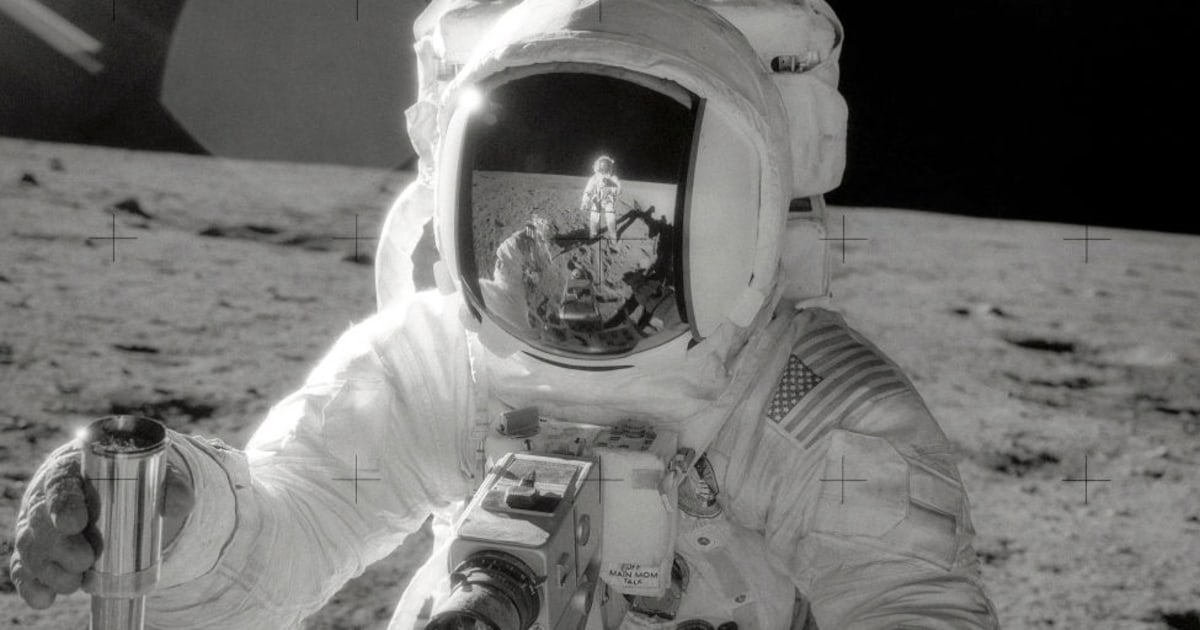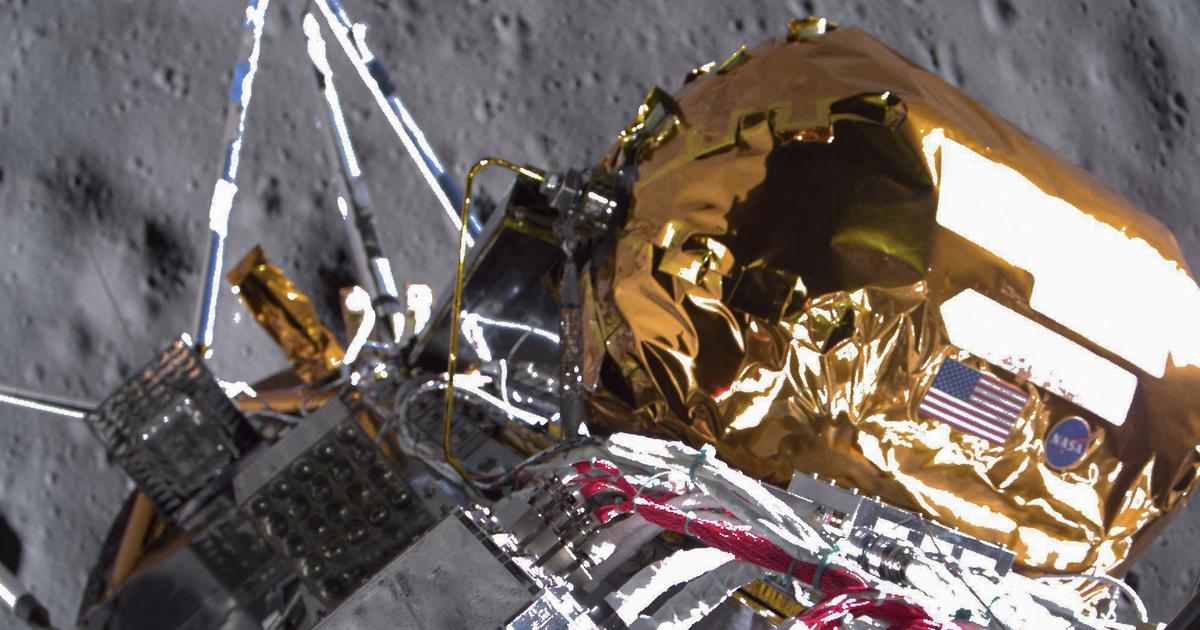NASA is preparing for this Saturday the launch of the unmanned rocket of the Artemis I mission, which will explore the south pole of the Moon and will pave the way for the first woman and the first black man to land on the moon in 2025.
But in forums and networks it is questioned why the Space Administration took half a century to return to the Moon after the historic mission of Apollo 11 in July 1969. Some even defend the false theory that we do not return because we never went.
[Everything you need to know about the historic Artemis mission]
American astronauts Gene Cernan and Harrison Schmitt undertook the last moonwalk in 1972, and questions about what has prevented other manned voyages are common on the Quora question-and-answer forum.
Historic photo from the 1969 Apollo 12 manned mission. Heritage Space / Heritage Images via Getty Images
Divided into three stages – Artemis I, II and III – the current mission will put technology and logistics to the test in order to one day set foot on Mars.
One of the reasons why now and not before, is competition again: China has already landed three robotic missions.
The space race with the former Soviet Union hastened America's plans on the Moon.
"We have to worry about them saying, 'This is our exclusive zone, stay out of it,'" NASA administrator Bill Nelson told The New York Times this week.
The lunar race has also been galvanized by the rise of private companies such as billionaires Elon Musk (with the SpaceX company) and Jeff Bezos (with Blue Origin).
These are the billionaires who are competing in the new space race
July 9, 202101:09
Among the answers on Quora, aside from the wild ones, several agree on these reasons for
NASA's
delay .
It costs a lot, a lot of money (by 2025, nearly $100 billion will have been spent on the Artemis program).
There is no public interest or political will.
The fear of failure (what if we fail?).
These reasons, according to experts, are sensible and we explain why.
1. It is very expensive
The Biden Administration has asked Congress for $25.9 billion for NASA in 2023. That budget includes funds for the Artemis program, lunar suits and exploration missions.
[NASA plans to launch the Artemis I mission to the Moon on Saturday, after a first engine failure]
Artemis funds will increase from 6,800 million dollars to 7,500 million in the next fiscal year, which begins in October, Ars Technica, a portal specialized in technology, detailed in March.
But it hasn't always been that way.
In 1965, NASA's share of the federal budget reached 4%, but "in the last 40 years it has remained below 1% and in the last 15 years it has approached 0.4%," said Walter Cunningham, NASA astronaut. Apollo 7, the first crewed Apollo mission, in testimony before Congress in 2015.
On video: The truth about a strange figure in the sky that some thought was a portal to another dimension
July 15, 202202:15
Cunningham insisted that resources, technology and, above all, political will are needed for a project as ambitious as Apollo to get off the ground.
“In 1961, the United States was willing to take the risk of going to the Moon.
It was a human risk, and a technical, economic and political risk,” he stated.
2. What for?
there are other priorities
In 2019, an article by the Pew research center revealed that Americans considered it important to remain the only ones to set foot on the Moon, but
sending more people into space should not be a priority for NASA
.
Some said they shouldn't even try.
In 1961, the United States was willing to take the risk of going to the Moon.
It was a human risk, and a technical, economic and political risk”
Walter Cunningham APOLLO 7 ASTRONAUT
Based on a 2018 survey, the center indicated that six out of 10 people consulted believed that NASA should focus "on monitoring the Earth's climate system."
Four out of 10 said that learning about space through scientific research and developing technologies that can be adapted to other uses should be a priority.
"It's too expensive and it's useless today
," one user wrote in an online discussion about manned missions to the Moon.
"We gathered the information we needed, why would they want to spend money and risk a breakdown trying to go there for no reason?"
"Mars is the next step," he added.
Pew also found that half of those surveyed believe space travel will be routine by 2068, but more than half say that even if it were, they wouldn't be interested in venturing off Earth.
3. A high political risk
The focus on space exploration has changed in each government.
Thus, for example, while George W. Bush wanted to return to the Moon and then explore Mars, Barak Obama considered that the objective was Mars, not the Moon.
"We've already been there,"
he asserted.
Every change of plans means millions of dollars
, either in financing new projects or canceling them.
This will be the launch of the unmanned mission Artemis I
Sept.
2, 202203:01
“Why should you believe what any president said about a prediction of something happening two administrations in the future?” former Canadian astronaut Chris Hadfield told Insider.
In addition, failing in a manned mission is a tragedy that no president wants to assume.
If it weren't for the political risk, we would be on the moon right now."
Jim Bridenstine, Former NASA Administrator
Cunningham acknowledged that this is why it is very difficult to get political support: "We don't have a national commitment."
Jim Bridenstine, NASA administrator under Donald Trump, said in 2019 that
"if it weren't for political risk, we'd be on the moon right now
. "
"In fact, we would probably be on Mars," he added.
[UFOs, a portal to another dimension? We verified the origin of the spiral of light seen in New Zealand]
Artemis, whose name is inspired by the Greek goddess of hunting and the wild world, promises to reveal new secrets about the Solar System, in addition to studying the effects of radiation on women's bodies and taking the first astronaut to the Moon .
In an article for The Conversation site, Marie-Claire Beaulieu, a specialist in Greek mythology, explained why the name of the program is evocative: Artemis is the daughter of Zeus and sister of Apollo, as the program with which we set foot on the Moon was called .
"More than 50 years later, Artemis will pick up where its twin brother left off, ushering in a more diverse era of human spaceflight."
If you want to receive our articles from T Verifica or send us topics about which you have doubts so that we can verify them, contact us via WhatsApp
by clicking on this link
.



/cloudfront-eu-central-1.images.arcpublishing.com/prisa/HYMG6UGJN5GLFOWR6YJPREOZXY.jpg)




/cloudfront-eu-central-1.images.arcpublishing.com/prisa/ZLW56GYGEBEJLPNDSNPUK2NJZE.jpg)